Need a starting point for MTG Arena? Allow these beginners tips to keep you from pulling a mulligan.
Now that you have downloaded MTG Arena, you're probably looking for beginners tips on how to get out of the starting gate. Whether you’re a newcomer to Magic or have been playing since the 90s, you’re likely wondering what’s next or how you can get the most out of MTGA.
Well, you’re in luck! We've created a list of the things that any long-time player would and should do if they were to begin again.
Use an MTG Arena tracker
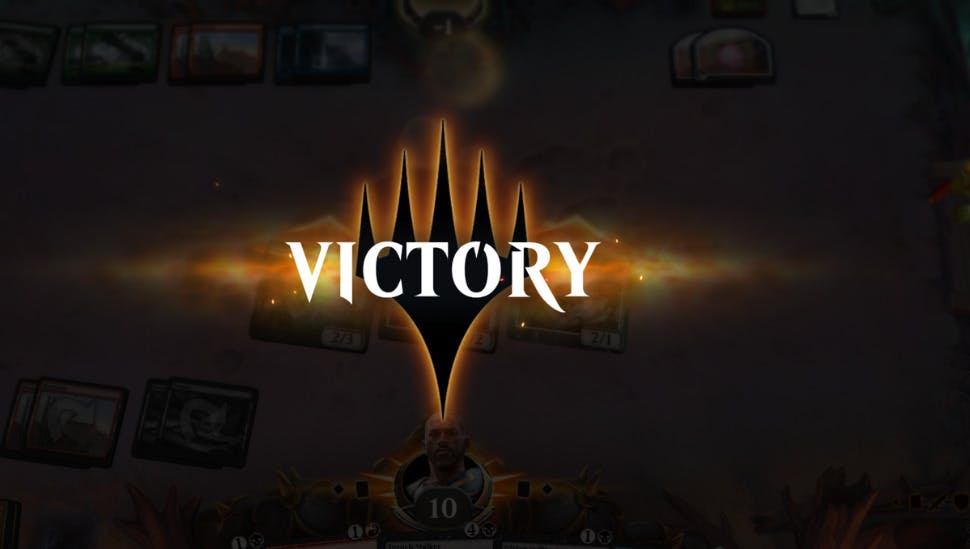
Trackers are third-party applications that run alongside MTGA to give you extra advice and assistance – like training wheels for the game. We recommend downloading an MTG Arena tracker like Arena Tutor if you’re playing on desktop. These are useful for keeping track of your collection, how successful your decks are and sharing your decks and progress with other players.
Arena Tutor is great because it also gives you advice about the Draft format – helping you with what cards you should pick and which decks you should build.
Get free cards with MTGA codes
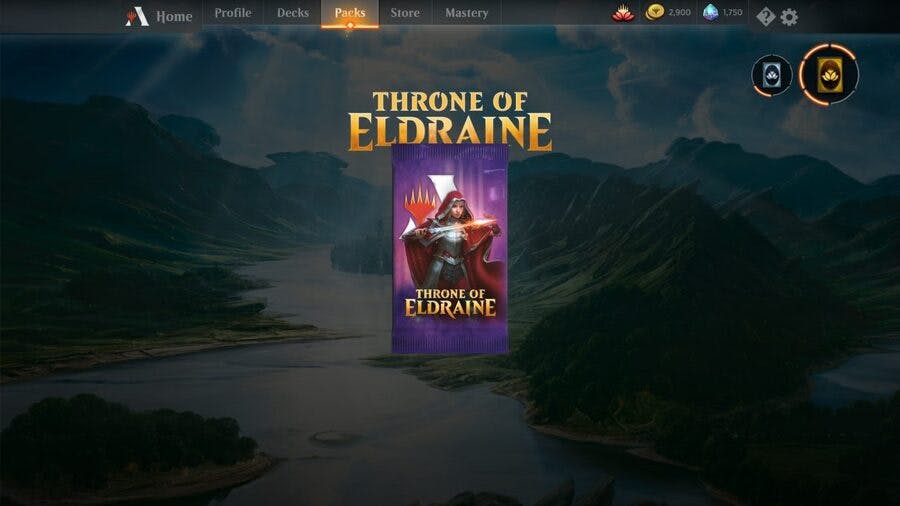
There are various promotional codes to claim in-game rewards via the store on Arena that new players can use to get a jump-start on their collection. While some of these codes are only redeemable once--like those found in prerelease kits that you get at in-store events--there are other codes released to the public so everyone can get some free stuff. If you take any of these MTG Arena beginners tips to heart, know that the codes are the way to go!
Booster codes are convenient for getting a variety of codes in short order and can get you at least three packs of every Standard-legal set. Every day, the list of valid codes changes, but Draftsim has a constantly-updated list of codes for you redeem almost 50 free packs on MTGA.
Complete the tutorials, get to know the interface
The tutorials on MTGA are a great way to get to know the rules if you’re brand new to Magic. They’re actually what I recommend new players use to learn the basics of gameplay when they’re looking to get into paper Magic.
Even if you’re a seasoned hand at the paper game, the tutorials are a helpful way to learn how to use the Arena interface.
Color challenges
There’s also an advanced tutorial called “Color Challenges” that you can do once you finish the initial tutorial. These are designed to teach you a bit about the different kinds of decks that you can play and what the different colors are competent at. Your opponents are bots that play the exact same way each game, so it’s more like a puzzle to solve to win these.
The benefit to completing these, aside from learning some more advanced skills, is that you unlock 10 free 2-color starter decks to supplement your original five mono-colored decks. The cards are added to your collection, setting you up at a solid place to start building your own decks.
Think about buying the mastery pass
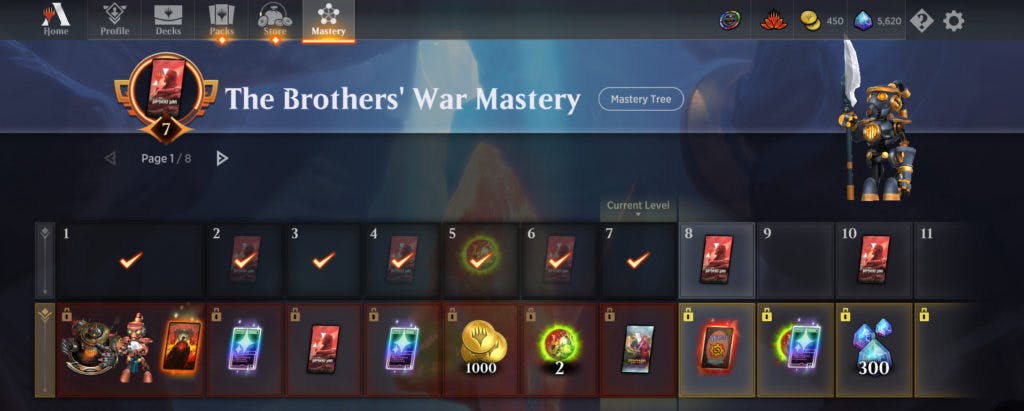
The Mastery Pass is Arena’s version of a season or battle pass, giving you access to bonus rewards. What makes this slightly different to a lot of online games with a similar concept is that you can buy the pass with in-game currency, meaning you can grind your way to it each season.
There’s a free version of the Pass that gets you 33 boosters of the current set. In addition, there's a small number of cosmetic items every set but the paid version obviously gives you a lot more.
The Mastery Pass itself also gives you in-game currency. For 3,400 gems and assuming you play enough to get the required experience, a season’s worth of Mastery Pass nets you:
- 1,200 gems
- 4,000 gold
- 20 boosters from current Standard sets
- 10 mythics from the current set
- 1 Draft token (worth 1,500 gems or 10,000 gold)
- A variety of cosmetic items
Getting gems that you can put towards your next Mastery Pass is fantastic and a fast way to gain levels in a hurry.
Try Limited
This is a big one for me, and not just because Limited is my favorite way to play. Playing Limited is a great way to build your collection, though it’s also just a fantastic way to play Magic in and of itself.
In Limited you build a deck with cards that you open in packs, either by opening six packs (Sealed) or by “drafting” the packs in a pod (Draft). The good thing here is that you get to keep the cards that you open, the only exception being phantom events.
You can also pay the entry fee with gold and win packs and gems depending on how many wins you manage when you play. This is the only way you can turn gold into gems, which you can then use to buy the Mastery Pass!
Deck upgrades
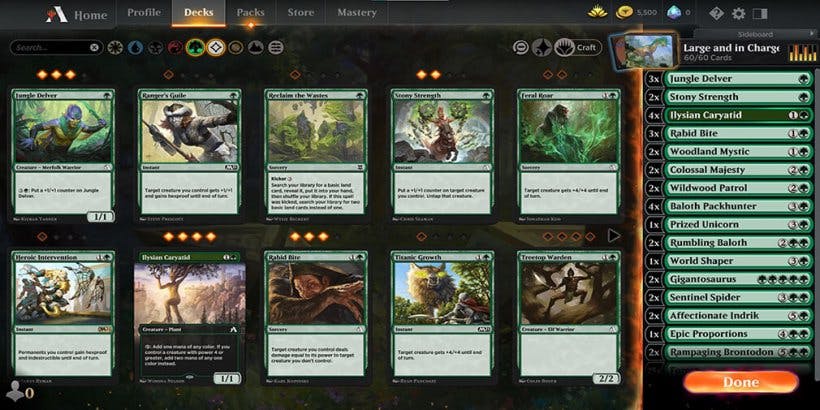
So you’ve got a handful of starter decks and have built your collection up with some free packs and your winnings from Limited. What now?
You could build a deck completely of your own imagination with what you have, or you could upgrade one you already have. The latter is probably going to be the choice that will cost you the fewest resources. You’d be surprised how easy it is to upgrade your starter decks to be a bit more competitive in the meta with just a couple changes.
Think about your Wildcards
If you want to go out and build your own deck or are planning to use some wildcards to craft some upgrades for your current decks, it’s probably wise to think about what you’re using said wildcards on.
Common and uncommon wildcards are plentiful. Once you’ve opened a few packs you’ll have a good selection of commons and uncommons anyway, so you’ll rarely be stuck for these. Rare and mythic wildcards are a different matter entirely and can really limit how you build decks on Arena.
It’s worth noting that different players have different experiences with what they run out of first, with lots of players reporting that they find rare wildcards more valuable than mythic ones.
WOTC is currently experimenting with selling wildcards directly, so if you’re happy to put some money in you can quickly get them this way--but it’s still probably better to buy packs instead because you both open and earn wildcards in packs. Otherwise, you have to wait until you open wildcards in packs or get them as a reward for opening packs: Every six packs you open gives you either a rare or mythic wildcard.
Don’t be afraid to check the meta
Looking up the top decks in the format comes with some stigma from some groups. But you shouldn’t be afraid to look up what’s working. Especially if you’re low on resources and want to maximize what you get out of them, even if it’s just to get a solid base for a deck you then make your own.
Ideally you want to find a deck that has a reasonable win rate, is relatively popular (to substantiate that win rate), and that is not overly expensive to build using your available wildcards.
Formats
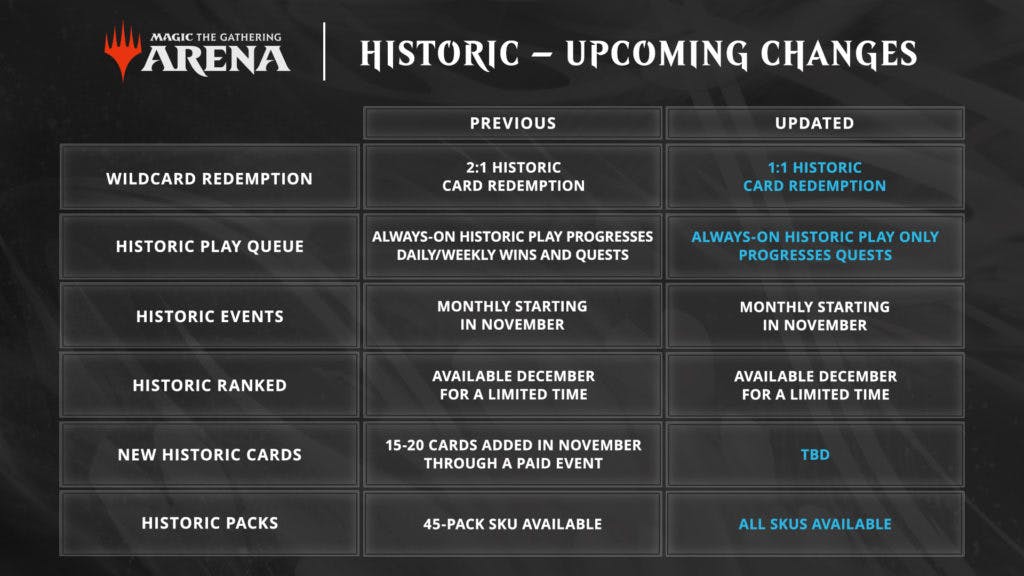
Speaking of formats, something that’s fairly unique to Magic is that there are so many different ways to play! Standard is the most basic way to play Arena. The idea is that it uses the previous two years’ worth of sets, with the oldest four “rotating out” every fall with the release of the next rotation’s first set.
There’s also Explorer/Pioneer if you want to play with older cards you have, and Historic, which uses all cards currently released on Arena with the exception of a few bans. You also have Limited formats as well as Brawl and Historic Brawl, which are similar to Commander in paper Magic.
Many choices exist with a good amount of crossover between them, so you're sure to find the format that calls out to you personally.
Rotation
The oldest four sets in Standard “rotate out” of Standard (and Alchemy) every fall, meaning you can no longer play those cards in the format. While you can still play these cards in formats like Historic and Explorer it’s worth being aware that rotation exists. You don’t want to go and craft a whole deck that’s going to rotate out in a month!
Content creators often create “rotation proof” decks in the run up to rotation which are a good safe option to build if you’re looking for something, even if the meta often changes with the fall set.
MTG Arena Tips: Daily Deals
The Arena Store has a section of Daily Deals, which are usually cosmetics following a specific theme for around 10% off their normal price. As the name implies, these change every day.
The important thing about this is that you can sometimes get free resources. For example, there may be an offer of 5,000 gold for the cost of 4,000 gold, netting you 1,000 gold when all is said and done. These are usually offered for either gold or gems and you’ll want to use gold regardless if gold or gems is the current offer.
Daily and Weekly Rewards
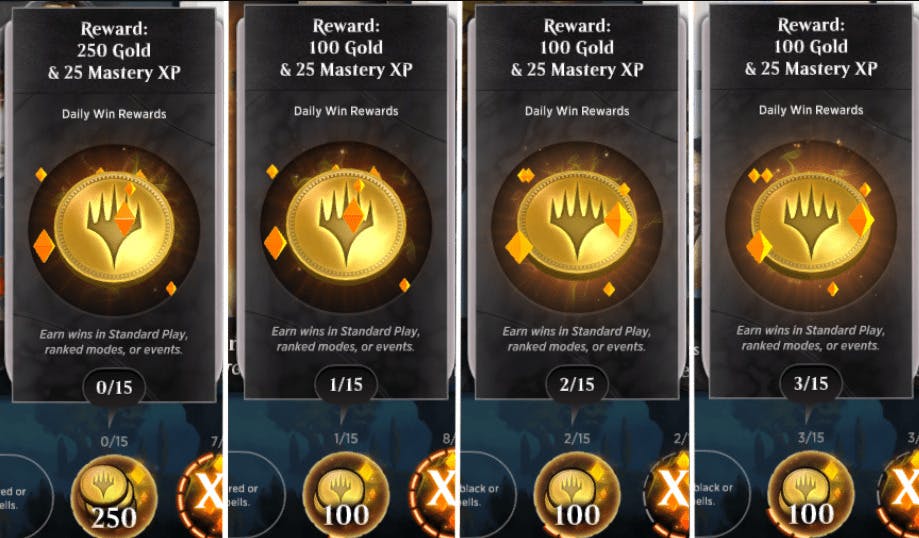
No set of MTG Arena tips for beginners would be complete without highlighting the rewards available on a daily and weekly basis! There are a number of rewards you can get from taking on the normal play queues. Some of them reset every day, and some reset weekly.
There are two different types when it comes to daily rewards. The first is daily wins. For your first 15 wins every day you get either gold or a random uncommon card--which is occasionally upgraded to Rare.
These rewards get smaller as you go along, with the first win giving 250 gold and the last just 25 gold. In total you can earn 650 gold each day.
Complete a new challenge to earn a reward of 500 gold, which will be something like “cast 30 red or blue spells” or “destroy 30 creatures.” It’ll sometimes be upgraded to a 750 gold challenge with higher requirements to fulfil.
You can have up to three daily challenges saved on your account at any one time. There are no more available if there are no free slots. Therefore, it’s best to try and keep at least one slot free to maximize your profits from these challenges. You can also re-roll a daily challenge once per day to get a new one.
The weekly rewards give you experience in the Mastery Track.
Midweek Magic
There’s a special event called “Midweek Magic” that happens from Tuesday to Thursday every week. It’s free to enter with prizes including two random rare cards from a Standard set and a cosmetic item if you win three times. While diving into Midweek magic may seem daunting, we hope these MTG Arena beginners tips will help light the way and get you winning ASAP.
The exact format varies for each event. Sometimes you need to build a deck, other times you’ll be provided with one. There’s also some sort of special rule to follow, or the game works in a unique way.
These are usually good fun and a nice change from the normal formats on offer on Arena.
Look at Paper Play
The last recommendation in our MTG Arena beginners tips is to look into paper, IRL MTG if you don’t already play. Arena is a great game, but the paper version has something that Arena just can’t replicate: the Gathering! The great thing is that a lot of the MTG Arena beginners tips we've given you can help the beginning process of learning physical MTG.
Arena and paper each have their own advantages, but you should at least have a go at paper Magic if you’ve never played before. It’ll give you a deeper insight into your Arena game.
Get out there and play
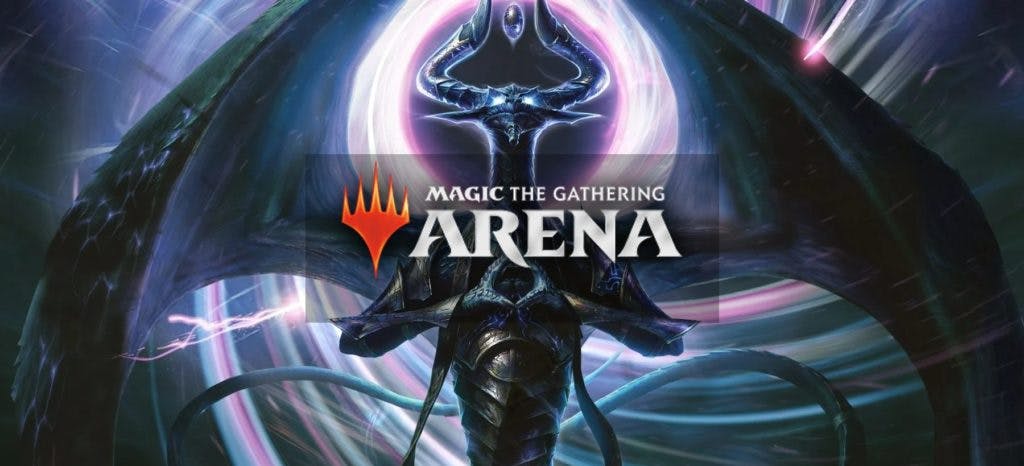
This wonderful and historic card game has so much to offer new players. Make some time to dive in and see what works for your style of play--you'll get an idea of where you want to go next and be on your way to dominating the rankings in no time. And if need be, refer back to these MTG Arena beginner tips to stay on the right track.
Best of luck in your MTGA journey, and keep an eye on esports.gg for esports updates and Draftsim for all your MTG Arena news and notes!